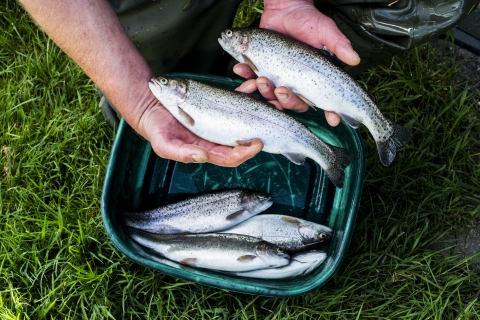European Economic
and Social Committee
Transitioning to sustainable energy in the EU fisheries and aquaculture sector: a path to climate neutrality
The European Economic and Social Committee (EESC) welcomes the European Commission's strategy on the energy transition of the EU fisheries and aquaculture sector in an opinion requested by the Spanish Presidency and adopted at the July plenary. Recognising the urgent need to reduce carbon emissions and promote sustainable, renewable and commercially viable energy alternatives, the EESC stresses the significance of achieving climate neutrality by 2050.
Mitigating climate change: The role of the fishing industry
The EESC emphasises that the fishing industry plays a vital role in mitigating the effects of climate change. Fishers provide one of the healthiest animal proteins with a minimal carbon footprint, with emissions from the sector projected to account for a small fraction of the world total in 2023, underscoring the industry's relatively low environmental impact. Nevertheless, the EESC urges continued efforts to enhance energy efficiency and reduce emissions further.
The decarbonisation of the fishing sector requires a comprehensive approach, financial incentives and embracing zero-emission energy sources,
said rapporteur of the opinion, Javier Garat Pérez. We have to balance realism and ambition. We need an appropriate and realistic decarbonisation timetable that considers technological, logistical, and legislative developments. The cost of the transition should not burden employers and workers in the maritime sectors or leave anyone behind. Balancing the goals of decarbonisation with economic viability is crucial for a successful energy transition.
Developing alternative and innovative green technologies
The EESC recognises the challenges posed in the development and global availability of alternative and innovative green technologies, new fuels, and carbon-neutral energy sources. It emphasises the importance of developing these fuels and the necessary infrastructure to achieve decarbonisation effectively. The EESC suggests hybridisation as an intermediate solution, while also exploring options beyond fossil fuels. In addition, it notes that any energy source change will require new vessels to be designed in a completely new way, with higher on-board capacity (gross tonnage) to accommodate new machinery. The EESC therefore calls on the European Commission to review the definition of "fishing capacity" in order to be able to implement new technologies related to the energy transition.
Financing the energy transition
The EESC acknowledges that the cost of decarbonising the fishing sector exceeds the scope of European funding and highlights the need for institutional support, targeted financing and credit measures accessible to all Member States and their fleets. The limitations of existing funds, such as the European Maritime, Fisheries and Aquaculture Fund (EMFAF), hinder the implementation of the transition. The EESC suggests exploring alternative sources of financing, such as the European Investment Bank, and redirecting resources linked to energy taxation to support the fisheries sector. The EESC calls on the European Commission to create an emergency fund that would speed up decarbonisation.
Towards a sustainable EU fisheries sector
In its report the EESC emphasises the need to address the energy transition within a broader strategic framework. It envisions a sustainable EU fisheries sector that aligns with the goals of climate neutrality and guides future work. This vision includes promoting pilot projects on new energy sources, developing innovative sea-industry value chains, generating sustainable jobs and fostering the circular economy. It stresses the importance of training crews to safely and effectively handle new technologies on board, while ensuring that the impacts of the transition do not disproportionately burden workers or companies.
By embracing the energy transition in the fisheries and aquaculture sector, the EU can lead the way towards a more sustainable and resilient future, reducing carbon emissions and preserving the health of our oceans for generations to come. (ks)
